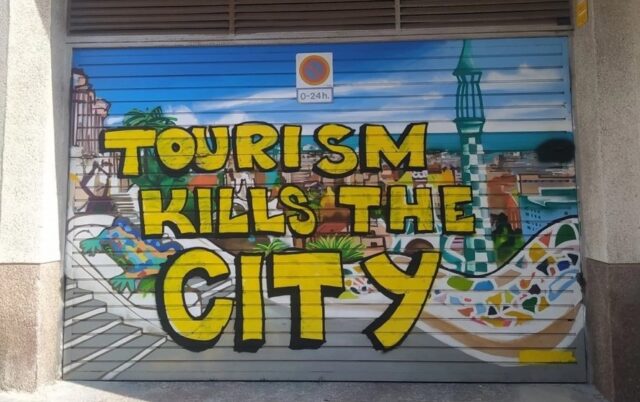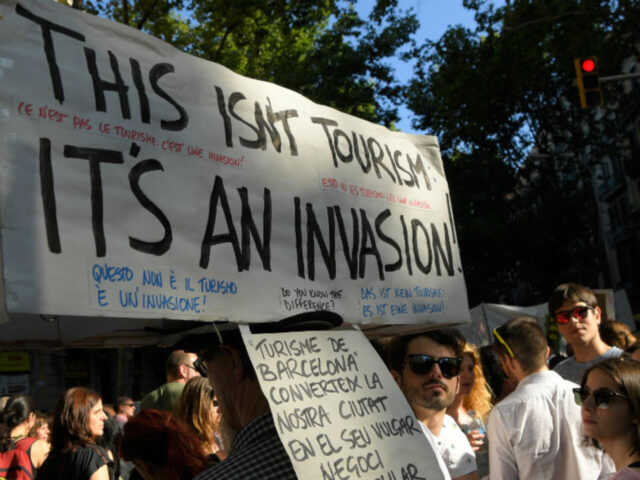Tourism is a powerful force that drives economic growth, cultural exchange, and global connectivity. However, the rapid and often unchecked expansion of tourism can lead to significant disruptions in the lives of local residents, leading to a range of social, economic, and environmental challenges. As the demand for travel continues to grow, it is essential to address these issues and move towards a model of sustainable tourism that benefits both visitors and locals alike. Sustainable tourism offers a solution, promoting practices that balance the needs of tourists, the environment, and local populations.


The disruption of daily life
- Overcrowding and congestion.
One of the most immediate and visible impacts of tourism is overcrowding. Popular destinations can become inundated with tourists, leading to congested streets, public transportation, and public spaces. For residents, this can mean longer commutes, difficulty accessing essential services, and a general decline in the quality of life.
Venice is a prime example of how tourism can lead to overcrowding. The city’s narrow streets and canals become virtually impassable during peak tourist seasons. For residents, this means longer commute times, difficulty accessing essential services, and a general decline in the quality of life. The overcrowding has also led to wear and tear on the city’s historic infrastructure, putting it at risk.
- Rising costs of living
Tourism can drive up the cost of living in several ways. The demand for short-term rental properties, such as those listed on Airbnb, can reduce the availability of long-term housing for residents, driving up rental prices. Additionally, the influx of tourists can lead to higher prices for goods and services, making it more expensive for locals to meet their daily needs.
An example of this is in Tenerife where over tourism has caused protests due to the rising costs of housing for locals. The influx of tourists and the popularity of short-term rental platforms like Airbnb, leads to many property owners prefeing to rent their homes to tourists at higher rates rather than to long-term residents. This has led to a housing shortage and skyrocketing rents, making it difficult for locals to afford to live in their own city.
- Environmental degradation
Tourists often flock to natural attractions, putting pressure on local ecosystems. Overuse of natural resources, pollution, and habitat destruction can result from unchecked tourism activities. For residents, this can mean the loss of natural beauty, reduced access to clean water, and other environmental impacts that degrade their quality of life.
Tourism contributes to over 5% of global greenhouse gas emissions, with transportation accounting for 90% of this, therefore it is extremely important that tourism is at a level which cities can maintain their natural beauty.
An example is Bali, where the natural beauty attracts millions of tourists every year but this comes at a cost. The island’s waste management systems are overwhelmed, leading to pollution of beaches and waterways. Deforestation to make way for resorts and other tourist facilities has also had a devastating impact on local ecosystems. For residents, this means not only a loss of natural beauty but also potential health risks.
- Cultural Erosion
While tourism can promote cultural exchange, it can also lead to the commercialization and erosion of local cultures. Traditional customs and practices may be altered or abandoned to cater to tourists’ expectations, leading to a loss of cultural identity for residents. The commodification of culture can also result in a superficial understanding of local traditions, reducing their authenticity and significance.
Barcelona has become a popular tourist destination, but this has led to a loss of cultural identity for the city’s residents. Traditional markets and local shops are being replaced by souvenir stores and international chains. The influx of tourists has also led to the commercialization of local festivals and traditions, diluting their cultural significance. Residents often feel like strangers in their own city, as the local culture is increasingly tailored to meet tourist expectations rather than preserving its authenticity.
Moving towards sustainable tourism
- Community involvement
Engaging local communities in tourism planning and decision-making processes is essential. Residents should have a say in how tourism develops in their area and how the benefits are distributed. This can help ensure that tourism initiatives align with the needs and values of the community, therefore by having an influence on decision making the community will feel involved and closer to tourists who visit their city.
- Regulation and management
Implementing regulations to control the number of tourists and the type of tourism activities can help manage the impact on local communities. This can include measures such as limiting the number of visitors to popular sites, enforcing environmental protection laws, and regulating short-term rentals.
- Promoting off season and less known places
Encouraging tourists to visit during the off-season or explore less popular destinations can help distribute the benefits of tourism more evenly and reduce pressure on overcrowded areas. This can also provide a more authentic and enjoyable experience for tourists. Leading to more jobs for residents in different areas and tourists will get to visit other beautiful areas of the country.
- Supporting local business
Tourism can be a powerful tool for economic development when it supports local businesses and entrepreneurs. Encouraging tourists to shop locally, dine at local restaurants, and participate in community-led tours can help ensure that the economic benefits of tourism stay within the community.
- Education and awareness
Raising awareness among tourists about the impact of their actions and promoting responsible travel behaviors can help mitigate negative effects. Tourists should be educated on how to minimize their environmental footprint, respect local cultures, and contribute positively to the destinations they visit. This can be achieved through informational campaigns, guided tours, and partnerships with travel agencies.
Amsterdam has faced significant challenges with over tourism, leading to overcrowding, noise pollution, and rising living costs for residents. In response, the city has implemented measures to manage tourist numbers and reduce the negative impacts. These include promoting lesser-known attractions, implementing a tourist tax, and regulating short-term rentals. The city also invests in community projects and infrastructure improvements to enhance the quality of life for residents.
Costa Rica is renowned for its commitment to ecotourism, which emphasizes the conservation of natural resources and biodiversity. The country has established numerous protected areas and national parks, which are funded by tourism revenue. Local communities are actively involved in conservation efforts and benefit from job opportunities in eco-lodges, guided tours, and sustainable agriculture. This model not only protects the environment but also supports local livelihoods.

Conclusion
Tourism has the potential to bring significant benefits, but it must be managed carefully to avoid disrupting the lives of local residents. By adopting sustainable tourism practices, we can create a more balanced and equitable approach that supports the well-being of both visitors and locals.
As tourists, it is our responsibility to be mindful of our impact and to support initiatives that promote sustainable and responsible tourism. Only then can we ensure that tourism remains a positive force for all.
Sustainable tourism is not just a trend; it is a necessity for the future of travel. By adopting sustainable practices, we can create a tourism industry that benefits everyone—tourists, local residents, and the environment.
Author:
Kiera Gray
Tourism management intern
University of Salford, Manchester, UK
Mentor:
Marija Lazarevic, MSc
CEO MariXperience ltd.

